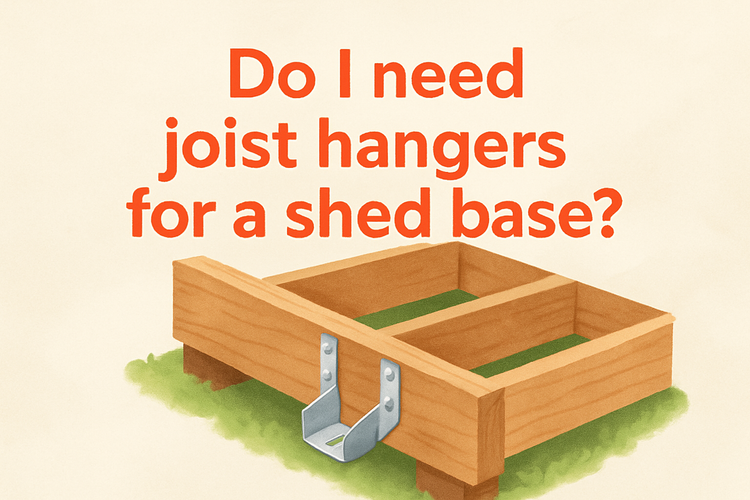Do I Need Joist Hanger For Shed Base

Why Consider Joist Hangers for a Shed Base?
Joist hangers are a popular option for supporting shed bases due to their strength and ease of installation. They help create a sturdy and level foundation by securing joists firmly in place.
Using joist hangers eliminates the need for complicated notching or toe-nailing. This makes constructing the base faster and more precise. Especially for DIYers, they provide a straightforward way to ensure the integrity of the structure. When working with treated timber, joist hangers also help to preserve the wood from excessive movement or splitting.
Given their affordability and wide availability, joist hangers can be a favourable option for nearly all shed types. They ensure that your floor joists remain fixed over time, especially when the shed is placed on uneven terrain or subject to variable weather conditions.
Browse quality Joist Hangers to explore the most suitable options for your project.
Structural Benefits of Using Joist Hangers
Joist hangers play a vital role in creating a resilient support framework for sheds. The way they wrap around joist ends offers significant holding power over time.
They help prevent downward force from impacting the overall stability of your shed base. By securing the joist ends to the supporting beams, there's less lateral movement, and this is vital for areas with shifting ground or heavy rainfall. Your shed remains level and square, even with constant use or added interior weight.
Additionally, joist hangers reduce the wear and tear typically seen in unsupported or toe-nailed constructions. You get longer life from your timber by distributing weight evenly and minimizing stress points.
A structural support system can be further enhanced using other hardware like Timber Frame Connectors, especially for larger sheds or garden outbuildings.
When You Might Not Need Joist Hangers
Not all shed bases require joist hangers. Some builds use ground-level skid foundations or concrete slabs where hangers aren't necessary.
If your shed uses an integral base resting directly on compacted ground or concrete pads, joists may simply rest on beams or blocking, avoiding the need for added support hardware. This is common for small garden sheds or temporary setups. However, builders should still consider moisture control, as wood in ground contact risks faster decay.
Another case could be when using a post and beam setup with notched timber. If beams are deeply notched to cradle joists, the physical interlock can serve a similar stabilizing role. Even then, the addition of reinforcing metal like Angle Brackets can enhance the structural reliability, especially where long-term use or heavy loading is expected.
Compatibility with Shed Base Types and Materials
Joist hangers can be used with a variety of shed base styles and materials. Most commonly, these are timber frames constructed with treated softwood or hardwood.
They are particularly ideal for use in raised sheds where airflow beneath the base is important for keeping moisture levels down. Elevated shed floors benefit from the added rigidity that joist hangers offer, especially when laid over uneven ground or support piers. Hangers fasten joists tightly to the support beams, keeping everything aligned and structurally sound.
Whether your shed base uses timber bearers, concrete blocks, or steel posts, joist hangers can often be adapted to fit. For metal posts or other non-traditional framing, it might be necessary to use specific Post Base supports or custom brackets to make everything compatible.
Durability and Long-Term Performance of Joist Hangers
Joist hangers are designed to provide long-term strength, especially when made from galvanized steel or other corrosion-resistant materials. This is essential for outdoor structures like sheds which are exposed to varying weather conditions throughout the year.
Well-installed hangers can withstand decades of use, offering minimal movement or degradation even under load. They help prevent sagging or shifting of the joists, which can otherwise lead to squeaky floors or misalignment over time. Regular inspection and proper timber treatment enhance their lifespan further.
Choosing high-quality joist hangers is the key. Always ensure you're using appropriate fasteners—typically approved screws or nails—rather than generic options. This ensures that the design tolerances are respected and structural integrity is maintained.
Explore our full range of Joist Hangers to find options that meet your shed size and base type requirements.
